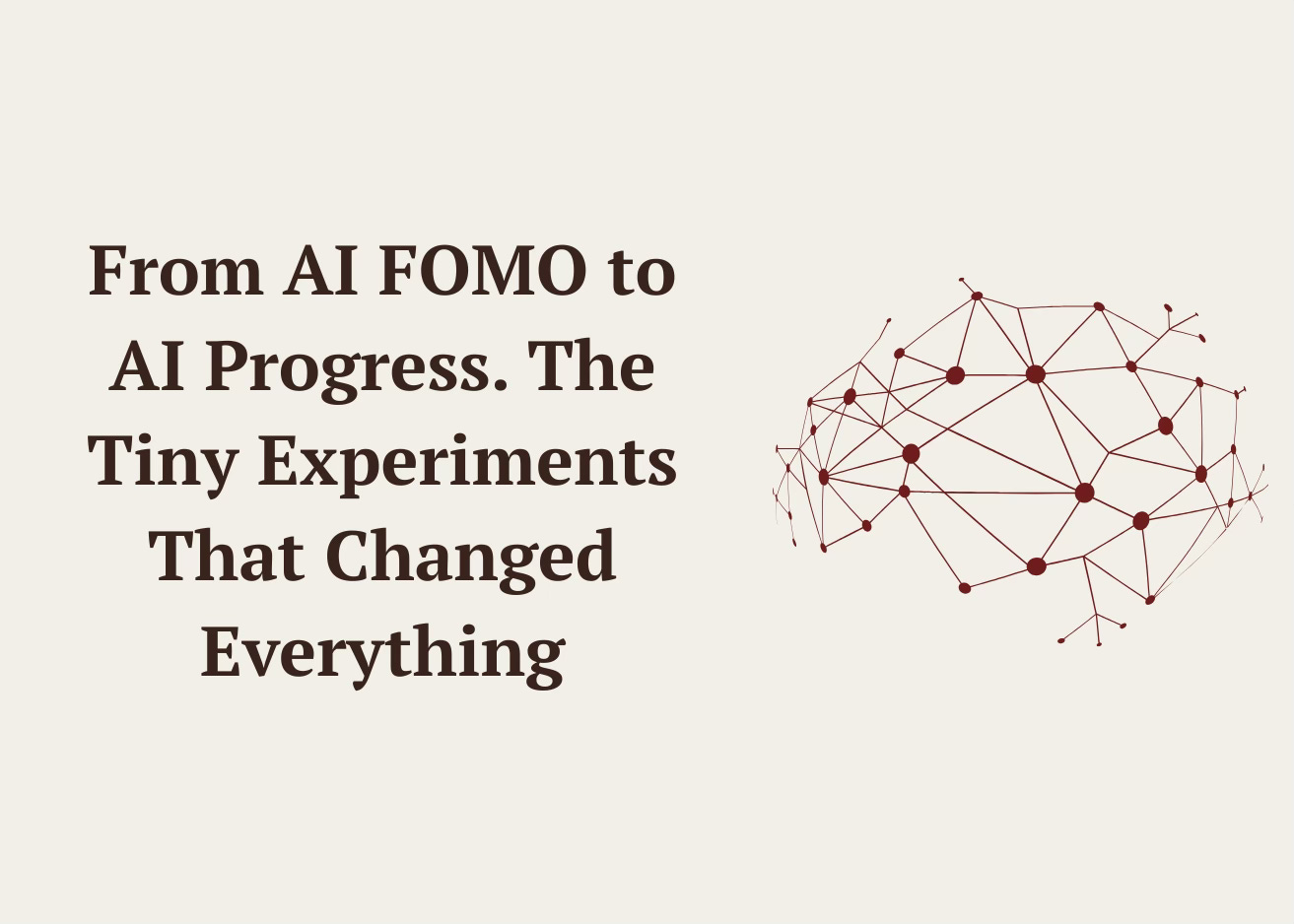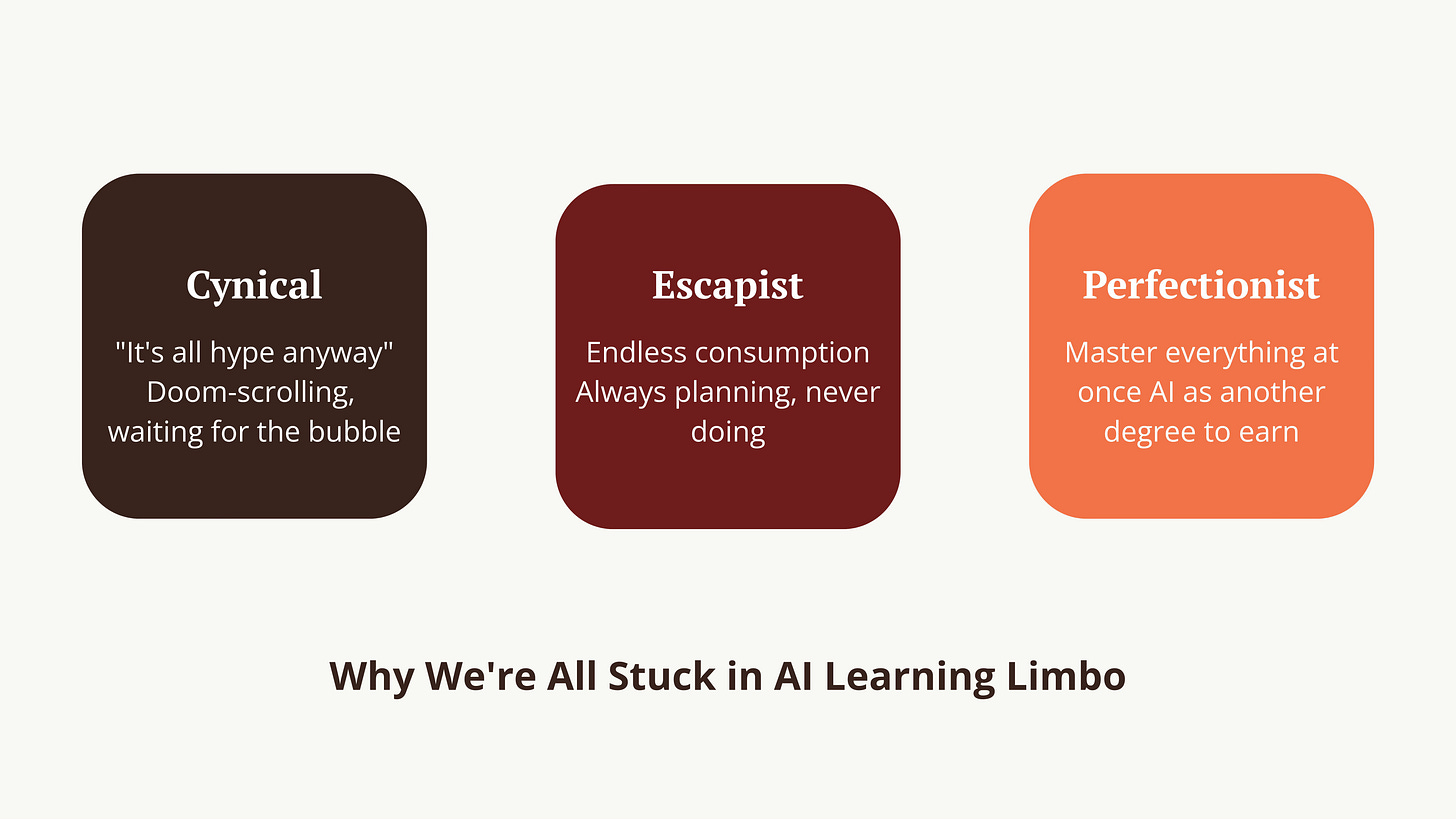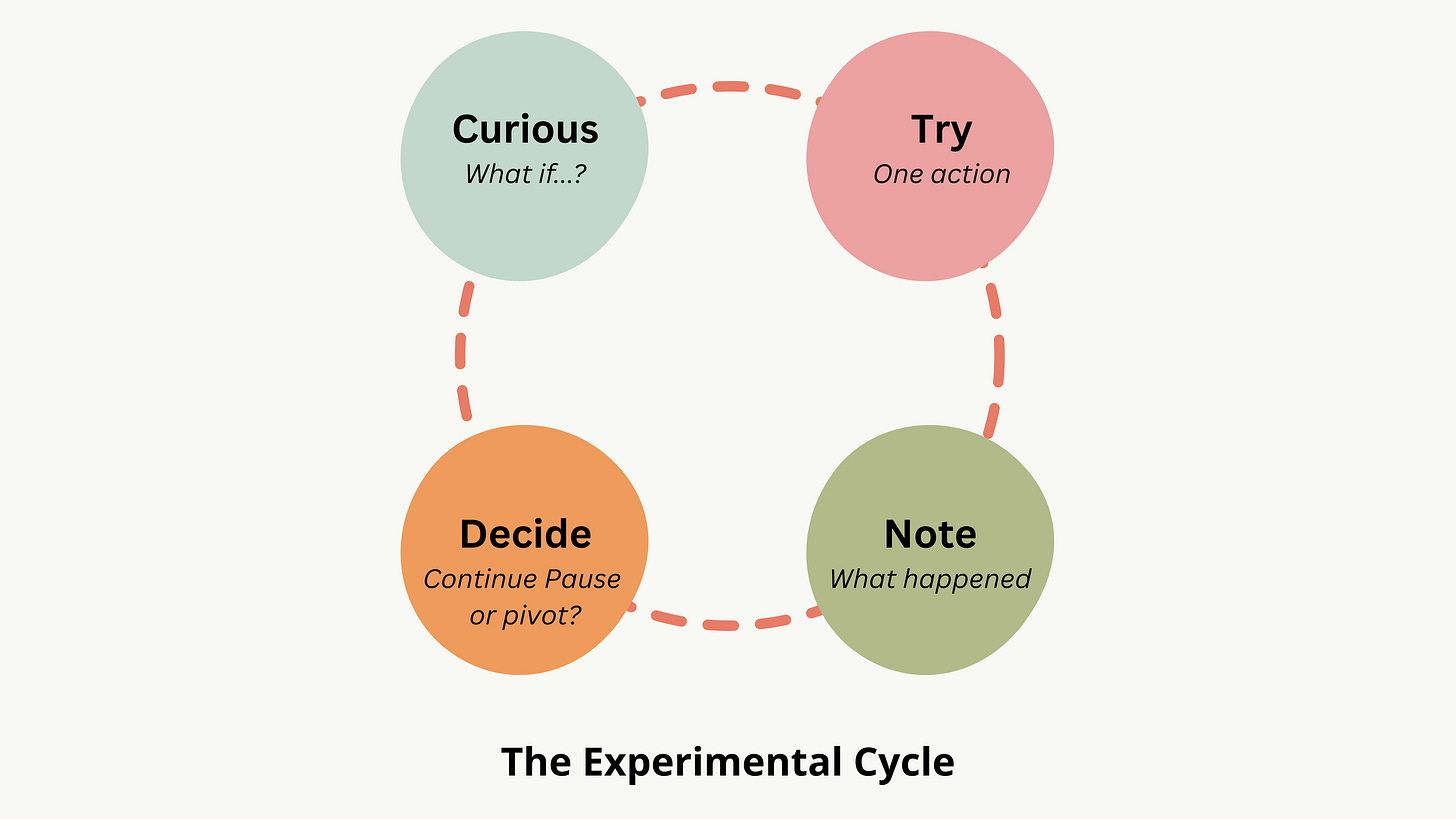Turn Your AI FOMO Into Real Skills (One Hour Weekly)
Join my 52-week experiment to learn AI through tiny weekly actions - no perfectionism, just progress
Last week, I had a weird realisation that hit me hard while teaching a client about AI automation.
Here I was, explaining advanced workflows and agent architectures, and I felt... behind. Not technically behind - I knew the tools. But behind in that annoying way where you know there's always something new in the AI space you haven't explored yet.
I literally work with AI every day. I help companies implement automations across sales, marketing, operations. I should be the last person feeling AI FOMO.
But that's exactly what made me realise something important about how we're all approaching AI wrong.
The confession every AI professional won't make
We both know how it goes. You read an amazing piece about AI. Maybe it's about a new ChatGPT feature or some mind-blowing automation. You bookmark it, thinking "I'll definitely try this later."
Later never comes.
I've been there. Actually, I was there just a few weeks ago. I'd started this newsletter with all the enthusiasm in the world. Wrote consistently for a few weeks, sharing what I was learning about AI. Then life happened - client deadlines, family stuff, the usual chaos - and suddenly I'd missed a week. Then two.
That's when I went down a research rabbit hole trying to understand why we all struggle with this. Found myself watching neuroscience videos at midnight (as you do), and stumbled onto this concept by Anne-Laure Le Cunff about "tiny experiments."
Suddenly, everything clicked.
Inside my bookmark graveyard (376 articles and counting)
You know that folder. The one stuffed with "must-read" AI articles, saved LinkedIn posts about ChatGPT prompts, and YouTube videos titled "This Changes Everything!"
Mine was getting embarrassing. Hundreds of bookmarks. Actual learning? Not so much.
And honestly? I bet yours might look similar. Because here's what nobody talks about - even those of us knee-deep in AI struggle to keep up. We just don't admit it publicly.
The thing is, learning isn't what it used to be. At university, learning was your job. Now? You've got actual work, maybe kids, definitely bills, probably a social life you're trying to maintain. Oh, and somewhere in there you're supposed to become an AI expert because, well, the future.
No wonder we're all secretly terrified.
The three mindsets keeping you stuck (I've had all three)
That neuroscience video by Anne-Laure Le Cunff on tiny experiments completely reframed how I think about this problem. If you want to dive deeper, she's got a whole book called "Tiny Experiments" - but the video brilliantly explains the three ways we unconsciously sabotage ourselves:
There's the cynical response - "AI is overhyped anyway, I'll wait for the bubble to burst." (Meanwhile, doom-scrolling articles about jobs disappearing.)
The escapist response - endlessly consuming AI content without actually doing anything. Planning to learn "when things calm down." Waiting for the perfect course or moment.
And the perfectionist response - trying to master everything at once. Signing up for bootcamps, cramming tutorials, treating AI like another degree to earn rather than a tool to explore.
I've cycled through all three. Sometimes in the same day.
My 52-week experiment starts now (want to join?)
But there's another way. One that doesn't require becoming a different person or finding magical extra hours in your day.
What if, instead of trying to "master AI," you just... experimented?
Not goals. Not habits. Experiments.
Here's what I'm doing. After struggling to keep up with this newsletter, I discovered this tiny experiments method. And starting this week - yes, literally this week - I'm applying it properly.
Instead of committing to "write a perfectly curated newsletter", I'm committing to one simple thing: Write one newsletter about what I'm learning each week - for 52 weeks.
No metrics to hit. No subscriber goals. Just the act of sitting down, reflecting on what I discovered that week, and sharing it with you.
I'm only tracking one thing - did I write it or not? Not opens, not engagement, not whether it was "good." Just: did I show up?
I'm three days into this experiment, and already something feels different. There's no pressure. Just curiosity about what I'll discover and share with you over these next weeks.
You can join me. We can run our experiments together - mine with writing, yours with whatever AI curiosity you've been putting off.
You don't need to commit for 52 weeks like me. Try 12 weeks. Let's see what happens.
Your personal AI experiment blueprint
Look, I'm sharing all this knowledge with you, but what matters is giving you practical tools you can actually apply.
Your 12-week experiment could be:
Going back to my previous newsletter about NotebookLM and committing to use it once a week for 12 weeks
"Every Friday, I'll use AI to tackle one annoying manual task" - for the next three months
"Each Monday morning, I'll spend 30 minutes exploring one new AI feature"
The point isn't the specific action. It's giving yourself permission to explore without the weight of mastery.
Because here's what I'm learning - AI isn't something you "learn" once and tick off. It's more like cooking. You don't master cooking; you just keep trying new recipes, some work, some don't, and gradually you get more comfortable in the kitchen.
One hour this week could change everything
If you're reading this thinking "okay but where do I even start?" - here's something stupidly simple:
Block one hour this week. Just one. Call it your "AI Play Hour". During that hour, pick ONE thing you're curious about. Not useful. Not strategic. Curious.
Maybe it's trying that NotebookLM feature I wrote about last month. Maybe it's seeing if AI can help plan your weekend. Maybe it's trying to automate that one task that drives you mental every Monday.
Doesn't matter. What matters is you showed up to play instead of perform.
And if you want accountability? Hit reply and tell me what you're committing to for the next 12 weeks. I genuinely want to know. Because every week when I sit down to write this, I'm reminded that we're all figuring this out together.
Nobody has AI figured out. Not me, not the Twitter gurus, not even the people building these tools. We're all just running experiments.
Might as well make yours fun. Have a great weekend!
Gaurav
P.S. Next week I'm diving into ChatGPT Projects - basically digital workspaces where AI remembers context. I tried using it for client proposals and... let's just say the results were interesting. If you've tried it, I'd love to hear what worked (or spectacularly didn't) for you.




